The Blue Diamond - July 2025

CONTENTS AT A GLANCE:
- Introduction
- ACM Reaffirms Commitment to 100% Open Access by 2026
- ACM Open Expands with Major Transformative Agreements
- Basic and Premium Digital Library – Content, Features, and Functionality
- ACM's AI Publication Strategy
- Call for Papers: CACM Practice Section
- ACM Journal Impact Factors Latest Release
- ACM Journals Inaugural Issues
- New ACM Journals Open for Submissions
- New ACM Journals
- New Titles From ACM Books
- ACM Publications Welcome New Editors-in-Chief
Introduction
Welcome to the July 2025 Issue of the Blue Diamond newsletter! This issue includes updates on a variety of exciting initiatives at ACM, including progress with ACM Open, changes to the Practice section of the Communications of the ACM, newly published book titles in the ACM Books Series, new ACM Journal inaugural issues, newly approved ACM Journals in artificial intelligence, and a welcome to new incoming Editors-in-Chief of seven ACM journals. ACM Publications is firing on all cylinders, and we are excited about the future of Computer Science and ACM’s role in advancing the field!
As many in the Computer Science community know, ACM is preparing for its transition to 100% Open Access publication on January 1, 2026—and this issue will provide some new information about this upcoming transition, including some details about ACM’s progress with institutional ACM Open licenses, the introduction of 2026 APC subsidies to assist authors whose institutions have not yet joined ACM Open, and the development and launch of Premium and Basic versions of the ACM Digital Library to support ACM’s transition to a fully Open Access Publisher.
There’s so much to be excited about at ACM, and as a volunteer-led organization we truly could not advance any of the above initiatives without the active involvement of our volunteers, authors, SIG leaders, Journal EICs and editorial boards, conference leaders, and institutional partners supporting the innovative ACM Open model. Thank you all for supporting the field and ACM!
Sincerely,
Scott Delman, ACM Director of Publications
ACM Reaffirms Commitment to 100% Open Access by 2026
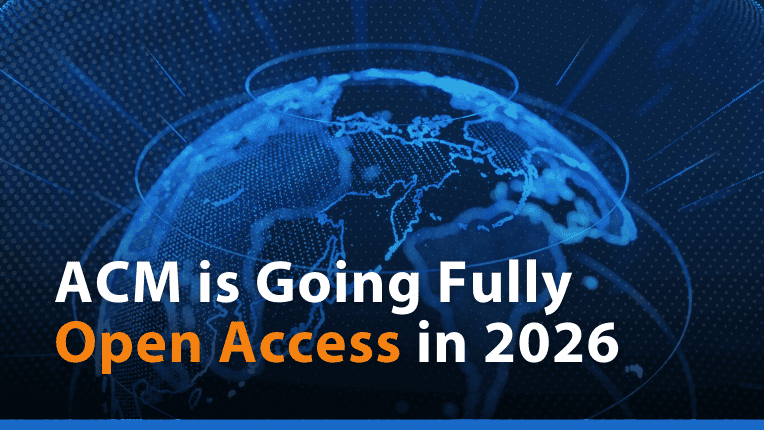
On November 5, 2024, the ACM Council affirmed its commitment to transition all ACM Publications to 100% Open Access on January 1, 2026. Since that time, at each in person meeting of the ACM Council, which typically meets at least 3 times per year, the Council has evaluated both the financial and editorial progress of the ACM Open model and reaffirmed its commitment to the transition on January 1, 2026 by taking another formal vote. Mostly recently, on June 13, 2025, the Council met in San Francisco and once again reaffirmed its commitment to the transition.
The ACM Open program was created to help institutions actively support Open Access publishing. We're proud to report that over 1,800 institutions worldwide are now participating, covering approximately 74% of all ACM journal and conference articles published on an annual basis.
ACM recognizes that this transition may present financial challenges for some institutions and authors. To ease the shift and provide more time for institutions to join ACM Open, the ACM Council has approved a temporary subsidy for Article Processing Charges (APCs) in 2026. Authors whose institutions are not yet part of the ACM Open program will pay a discounted APC rate of $950/$250 (Journal/Proceeding), for ACM/SIG members and $1,450/$350 (Journal/Proceeding), for non-members. We encourage authors to use this transitional year to advocate for their institutions to join ACM Open.
NOTE: This is not a permanent reduction in APC pricing. Instead, ACM is subsidizing APC costs in 2026 to support the community during this transition.
ACM strongly supports a fully Open Access future. Open Access articles receive 2–3 times more downloads and 70% more citations than paywalled content. We urge authors to contribute to this effort by paying APCs and encouraging their institutions to participate in the ACM Open program.
Beginning in January 2026, all ACM conference proceedings and journal articles will be published Open Access. This means that many articles submitted during the remainder of 2025—and ultimately published in 2026—will fall under the new Open Access model.
Additionally, the entire ACM Digital Library archive will also be made Open Access.
At that time, ACM will be launching two tiers of access to the ACM Digital Library platform, including Basic and Premium versions. All ACM Publications will be included in both tiers, with the Basic version containing unrestricted access to approximately 800,000 full-text articles published by ACM dating back to 1951. The Premium version will include those same articles but also access to the ACM Guide to Computing Literature Index, the full-text of many non-ACM publications that are hosted on an exclusive or non-exclusive basis in the ACM DL, and the Premium version will offer enhanced features, data, and analytics to enrich the user experience. The Premium version is a must-have for individuals and institutions working in the field of computer science, as it is the largest and most heavily used curated database of high quality computing research, practice, and educational materials—as well as advanced features that enable those working in the field to conduct research and literature searches by all of the major Publishers in Computing. ACM is building new advanced features and functionality into the DL Premium platform, including AI Assisted Search, AI Enabled Video Transcription and Search, ACM / IEEE Joint Conference Proceedings, and a growing list of cutting-edge features that will be rolled out over the course of 2026 and 2027.
Institutions with ACM Open agreements will automatically receive Premium access. Institutions not yet participating can subscribe to the Premium version, and individual Premium subscriptions will also be available for ACM Members.
ACM Open Expands with Major Transformative Agreements
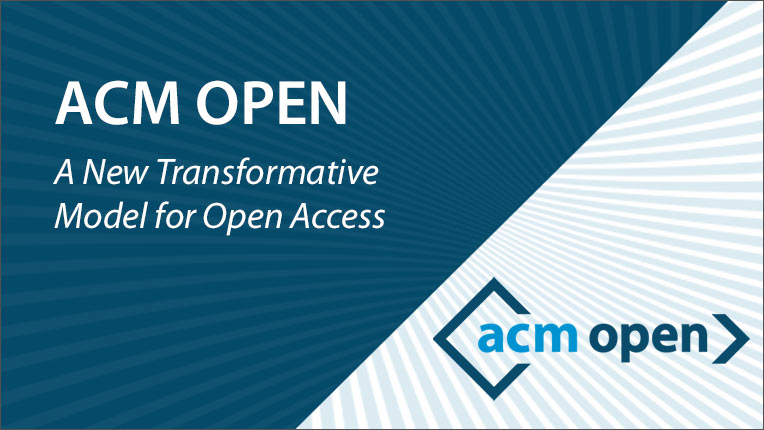
ACM has secured two new three-year, nationwide Transformative Agreements: India’s One Nation One Subscription (ONOS), covering 6,500 publicly funded institutions; and eight regional Canadian consortia, representing 72 institutions. Both agreements—and a growing list of others—can now be explored via our new ACM Open participants page.
As of today, 2,740 institutions (and counting) are actively participating in ACM Open, enabling authors worldwide to publish without Article Processing Charges (APCs) and providing access to the largest corpus of computing research in the world.
We are also proud to welcome Cornell University, a global leader in computing and information science, as the latest institution to join ACM Open through a new three-year read-and-publish agreement. This continues Cornell’s strong commitment to Open Access and the sustainable sharing of research.
The rapid growth of ACM Open has led to a significant increase in coverage, with 74% of ACM journal and conference articles now included under existing licenses.
Lastly, please read Scott Delman’s “Rethinking the Model for Sustainable Open Access” in Research Information posted on June 26th.
To learn more, visit our new Librarians Gateway and watch the ACM Open promotional video.
Basic and Premium Digital Library – Content, Features, and Functionality
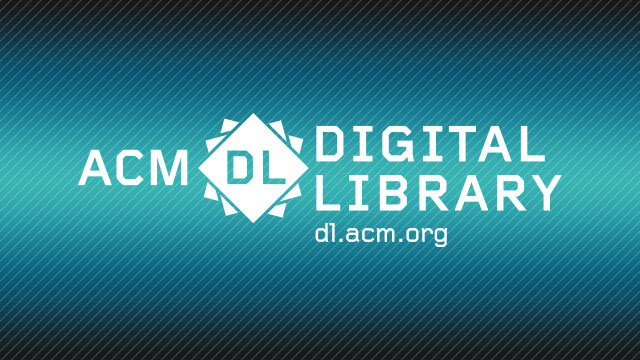
As detailed in the last issue of The Blue Diamond, ACM is preparing to go fully Open Access at the end of 2025. As part of this effort, the ACM Digital Library will offer two separate experiences: Basic and Premium. While both editions will provide open access to all ACM-published content, Premium users will also enjoy additional functionality designed to support researchers.
These premium features include a mix of existing functionality (such as access to the ACM Guide to Computing Literature) as well as features under development now, such as cross-journal topic alerts and access to articles in machine-readable XML.
The feature roadmap is informed by extensive user research performed by ACM and members of its Digital Library Board, including user surveys and two in-person focus groups: one in late 2024 hosted by MIT and another at the 2025 SIGCHI annual meeting.
An important finding of this user research so far has highlighted how librarians' reporting needs are changing amid the Open Access transition. Specifically, as publishers transition to Open Access, institutions increasingly need data on the usage of scholarly features—not just content—on sites like the ACM Digital Library. As such, ACM is investing in creating COUNTER-like data feeds to help librarians understand how paid features, such as semantic indexing tools, support research efforts within ACM OPEN institutions.
But these improvements are not limited only to paying subscribers: ACM is committed to improving the site experience for all users as part of this transition. Some early improvements, such as streamlining the facets and filters available in search results, are already available live to all users.
ACM's current development priorities are to complete the Basic edition of the new site, followed by the first iteration of the Premium edition, both before the end of 2025. After the Digital Library transitions to Open Access on January 1, 2026, ACM has prepared a robust roadmap of additional premium features to develop over the coming years. Some of these features will involve exciting new integrations with third parties, especially in areas leveraging AI and analytics.
In the meantime, please watch this space: in the coming months, ACM will be opening both the Basic and Premium editions of the Digital Library for a limited public Beta. This will coincide with a public comment period where feedback from all users will be gathered and considered.
ACM's AI Publication Strategy
In response to the rapidly growing importance of AI and related technologies in computing research and practice, the ACM Publications Board has established a new AI Publications Steering Committee to support the strategic development of ACM’s publication portfolio in these areas. The Committee serves in an advisory role, working closely with the New Publications Committee on proposals that relate to AI, with the Assessment & Search Committee on evaluation of existing AI publications and EiC searches, and with the Publications Board on overall strategy as it relates to AI publications. The Committee members are Francesca Rossi (IBM, Co-Chair), Sven Koenig (UC Irvine, Co-Chair), Jihie Kim (Dongguk University), and Peter Stuckey (Monash University).
The following new journals have recently been added to ACM’s portfolio of AI-related publications:
- ACM Transactions on Probabilistic Machine Learning (inaugural issue published March 2025)
- ACM Transactions on AI for Science (opening for submissions pring 2025)
In addition, ACM Transactions on AI Security and Privacy (TAISAP)—Editors-in-Chief: Murat Kantarcioglu, Virginia Tech, Patrick McDaniel, University of Wisconsin-Madison, and Sagar Samtani, Indiana University—was approved for launch by the ACM Publications Board at its March 2025 meeting.
Call for Papers: CACM Practice Section

Communications of the ACM (CACM) is ACM’s flagship magazine. It is sent to all ACM members, and its articles are available open access. Although CACM has long had a strong academic and research focus, it also regularly publishes articles of interest to practitioners.
CACM is promoting its new Practice section to be co-equal with its long-standing Research section. The new Practice section will accept submissions and publish articles of lasting interest that enhance practitioners’ understanding of computing and enhance their job performance. The scope of this section includes technical advances, development practices, organizational structures, examples of successful systems, and other topics of interest to computing practitioners. Articles need not be tied to academic or industrial research. However, they should be of interest to a significant number of practitioners. Highly specialized articles or articles demanding a deep technical background are unlikely to pass this test.
Visit the CACM call page for more information, and pass the word onto your friends and colleagues.
ACM Journal Impact Factors Latest Release
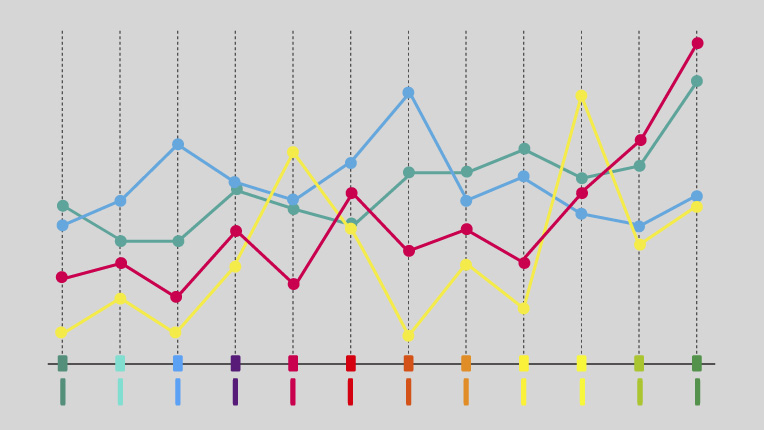
ACM is proud to celebrate the strong success of its publications in the latest Journal Citation Reports (JCR) from Clarivate Analytics, with over 75% of ACM journals indexed in the JCR increasing their impact factors and the highest number to date of journals ranked in the first quartile in one or more categories. Leading survey and tutorial journal ACM Computing Surveys (CSUR) continued its multi-year ascent in the rankings with an all-time-high impact factor of 28.0, taking top ranking in the Computer Science, Theory & Methods category for the second year in a row.
The ACM program had strong performance across the board. Highlights included flagship magazine Communications of the ACM (CACM) with an impact factor of 12.2, giving it a first-place ranking for the third year in a row in the Computer Science, Hardware & Architecture category, and rankings of 3 out of 128 in Computer Science, Software Engineering and 5 out of 147 in Computer Science, Theory & Methods. ACM Transactions on Graphics (TOG) received its highest impact factor to date, 9.5, and a ranking of 5 of 128 journals in the Computer Science, Software Engineering category. ACM Transactions on Information Systems (TOIS) increased its impact factor by nearly 70% to 9.1 for a ranking of 10 of 258 in Computer Science, Information Systems.
ACM Transactions on Computing for Healthcare (HEALTH) had an impressive start to its inclusion in the JCR with a first-time impact factor of 8.0 and first quartile rankings in its two categories of Computer Science, Interdisciplinary Applications and Medical Informatics, placing 3 of 48 in the latter category.
Other strong performances included ACM Transactions on Quantum Computing (TQC) with an impact factor of 6.8 and first quartile rankings in both Computer Science, Theory & Methods and Quantum Science & Technology; ACM Transactions on Intelligent Systems and Technology (TIST) with an impact factor of 6.6 and first quartile rankings in the Computer Science, Artificial Intelligence and Computer Science, Information Systems categories; ACM Transactions on Computer-Human Interaction (TOCHI), which increased nearly 40% for its highest ever impact factor of 6.6 and first quartile placement in both of its categories, including fourth place in Computer Science, Cybernetics; ACM Transactions on Software Engineering and Methodology (TOSEM) at 6.2 and a rank of 9 of 128 in Computer Science, Software Engineering; ACM Transactions on Multimedia Computing, Communications, and Applications (TOMM) at 6.0; and ACM Transactions on Human-Robot Interaction (THRI) at 5.5, placing it 10 of 48 in Robotics
Numerous other ACM journals received their highest impact factors to date, including ACM Transactions on Interactive Intelligent Systems (TiiS) and ACM Transactions on Knowledge Discovery from Data (TKDD) both at 4.8; ACM Transactions on Sensor Networks (TOSN) at 4.7; Proceedings of the ACM on Interactive, Mobile, Wearable and Ubiquitous Technologies (IMWUT) at 4.5; ACM Transactions on the Web (TWEB) at 4.1; ACM Transactions on Computing Education (TOCE) at 3.8; ACM Transactions on Internet of Things (TIOT) at 3.7; ACM Transactions on Management Information Systems (TMIS) at 3.6; and ACM Transactions on Accessible Computing (TACCESS) at 3.5.
Reflecting on this success, ACM’s Director of Publications Scott Delman commented, “The stellar performance of ACM’s publications in the JCR is a strong indication of the real-world benefits of ACM’s transition to open access publishing across our program. As an increasing proportion of our papers are open access, they are getting cited, downloaded, and used at ever higher rates.”
Associate Director of Publications Sara Kate Heukerott added, “It is incredibly gratifying to see the amazing work of our authors, editors, and journal teams recognized in this way. A tremendous amount of time and dedication go into each paper published by ACM, and this high level of citation activity demonstrates that we are truly living ACM’s mission of advancing computing as a science & profession.”
ACM Journals Inaugural Issues
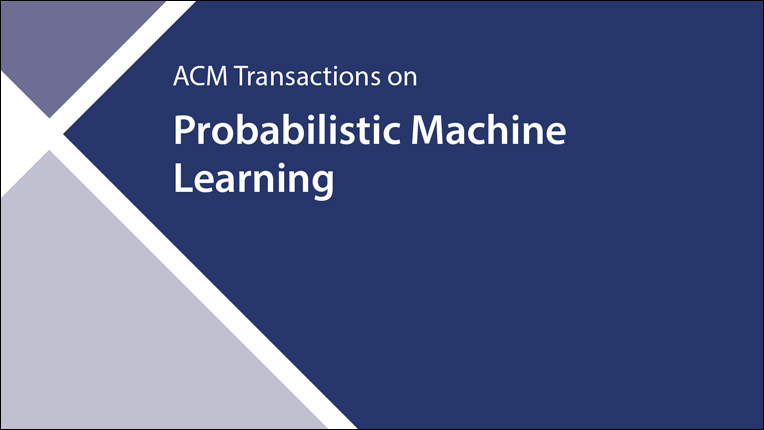
ACM has announced the publication of the first issue of the ACM Transactions on Probabilistic Machine Learning (TOPML), a new peer-reviewed publication. ACM Transactions on Probabilistic Machine Learning is open for submissions at https://mc.manuscriptcentral.com/topml.
TOPML focuses on probabilistic methods that learn from data to improve performance on decision-making or prediction tasks under uncertainty. Optimization, decision-theoretic or information-theoretic methods are within the remit if they are underpinned by a probabilistic structure. Probabilistic methods may be harnessed to address questions related to statistical inference, uncertainty quantification, predictive calibration, data generation and sampling, causal inference, stability, and scalability. Examples of approaches relevant to the scope include Bayesian modelling and inference, variational inference, Gaussian processes, Monte Carlo sampling, Stein-based methods, and ensemble modelling. Examples of models for which probabilistic approaches are sought include neural networks, kernel-based models, graph-based models, reinforcement learning models, recommender systems, and statistical and stochastic models. Ethical considerations of probabilistic machine learning, such as data privacy and algorithmic fairness, should be addressed in papers where there is a direct ethical connection or context for the work being described.
The journal welcomes theoretical, methodological, and applied contributions. Purely theoretical contributions are of interest if they introduce novel methodology. Methodological and applied contributions are of interest provided that proposed probabilistic approaches are motivated and empirically corroborated by non-trivial examples or applications. Multidisciplinary approaches with a probabilistic structure are within the scope.
New ACM Journals Open for Submissions
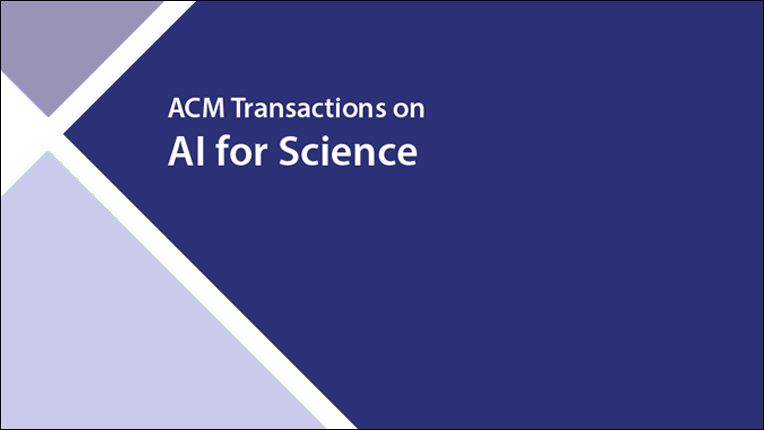
ACM Transactions on AI for Science (TAIS), is now accepting submissions. TAIS speaks to a breadth of methodological researchers in AI/ML and science and engineering researchers. The audience for the journal includes core AI researchers who are more aligned to Computer Science, Applied/Engineering Mathematics, and Statistics, as well as those who are aligned to specific scientific subjects from Physics to Civil Engineering.
The journal aims to publish articles that demonstrate scientific challenges can drive new AI (and reciprocally) and that experts in computational methods can have domain-specific mastery and drive new science themselves. The journal will publish original research, which is: driving new methodological developments in artificial intelligence and machine learning of relevance to science and engineering; method-led—where a new method is demonstrated with scientific relevance; driving new science and engineering; and science-led—where a careful data-analysis method is used to drive scientific discover.
New ACM Journals
The primary scope of ACM Transactions on AI Security and Privacy TAISAP is to develop methods for assessing the security of AI models, AI-enabled systems, and broader AI environments. In this context, security includes: (1) the security of AI models, including adversarial attacks on AI and technical vulnerabilities of AI, (2) privacy concerns in AI, and (3) the deployment of AI and machine learning in cybersecurity applications, including security operations centers and cyber threat intelligence. Broader socio-technical themes such as AI safety, dependability, and governance are considered out of scope for TAISAP. TAISAP publishes research investigating all aspects of AI security and privacy, including models, systems, and environments. Research areas related to AI security include examining adversarial attacks, technical vulnerabilities within AI, and privacy concerns related to AI model training and deployment. We also welcome submissions exploring AI’s application in cybersecurity, such as within security operations centers, open source software security, and cyber threat intelligence.
ACM AI Letters is envisioned to become the premier rapid-publication venue for impactful, concise, and timely communications in AI. Bridging a crucial gap between traditional conferences and journals, ACM AI Letters will feature short peer-reviewed contributions that accelerate knowledge dissemination across academia and industry. This unique publication prioritizes theoretical breakthroughs, algorithmic innovation, practical real-world applications, and critical societal implications, including ethics, policy, and responsible AI. It also introduces a distinctive space for rigorously reviewed opinion pieces and policy briefs, promoting swift engagement with contemporary issues shaping the AI landscape. For more information on AILET, contact: [email protected].
New Titles From ACM Books
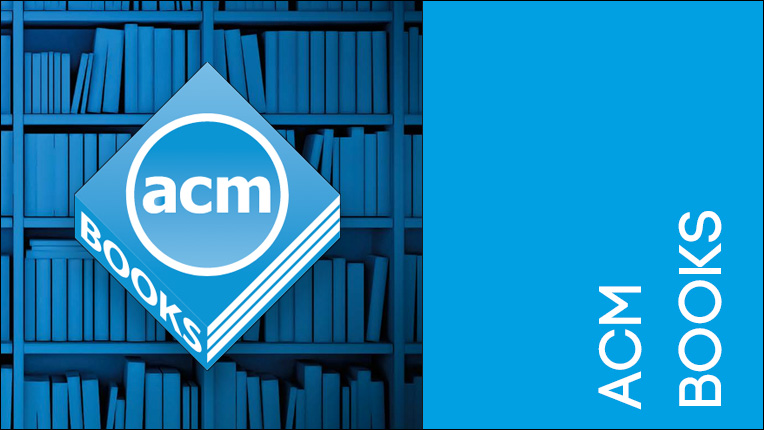
The following new titles have recently been published by ACM Books:
- Sustainable Interactive Wireless Stickers: From Materials to Devices to Applications by Nivedita Arora
- Calculated Imagery: A History of Computer Graphics in Hollywood Cinema by Mark J.P. Wolf
- Indistinguishability Obfuscation from Well-Studied Assumptions by Aayush Jain
- Formal Verification of Just-in-Time Compilation by Aurèle Barrière
- The Seymour Cray Era of Supercomputers: From Fast Machines to Fast Codes by Boelie Elzen and Donald MacKenzie
- Information Retrieval: Advanced Topics and Techniques edited by Omar Alonso and Ricardo Baeza-Yates
- Formal Methods for Safe Autonomy: Data-driven Verification, Synthesis, and Applications by Chuchu Fan
All ACM Books titles are available for purchase in print and electronic formats via the ACM Digital Library.
Generous discounts on ACM Books are available to Professional and Student Members of ACM. Professional Members receive a 25% discount on all books, and Student Members receive a 30% discount. In addition, Professional Members can subscribe to ACM Books for digital access to all books in the series for $29 per year, and Student Members can subscribe for $10 per year.
ACM Publications Welcome New Editors-in-Chief
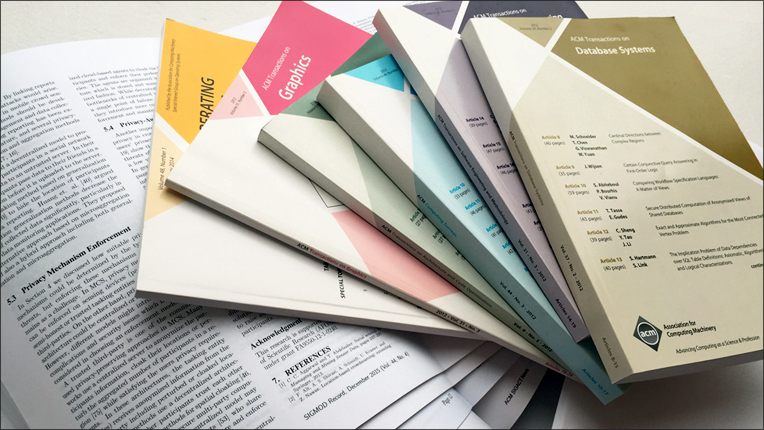
ACM Computing Surveys (CSUR) welcomes My T. Thai (University of Florida, USA) and Hanghang Tong (University of Illinois at Urbana-Champaign, USA) as Co-Editors-in-Chief, with a term beginning July 1, 2025.
ACM Formal Aspects of Computing (FAC) welcomes Einar Broch Johnsen (University of Oslo, Norway) and Maurice ter Beek (CNR-ISTI, Italy) as its new Co-Editors-in-Chief for the term of July 1, 2025 to June 30, 2028
ACM's new journal, ACM Transactions on AI Security and Privacy (TAISAP)—which aims to develop methods for assessing the security of AI models, AI-enabled systems, and broader AI environments—welcomes their inaugural Co-Editors-in-Chief. They are Murat Kantarcioglu (Virginia Tech), Patrick McDaniel (University of Wisconsin-Madison), Sagar Samtani (Indiana University). Their term is from April 1, 2025 through March 31, 2028.
ACM's new journal, ACM AI Letters (AILET)—which aims to become the premier rapid-publication venue for impactful, concise, and timely communications in AI—welcomes their inaugural Co-Editors-in-Chief. They are Nitesh Chawla, University of Notre Dame, USA; Barry O’Sullivan, University College Cork, Ireland; and Richa Singh, IIT Jodhpur, India. Their term is from June 1, 2025 through May 31, 2028. For more information on AILET, contact: [email protected].
ACM Transactions on Social Computing (TSC) welcomes new Co-Editors-in-Chief Xiaoming Fu (University of Göttingen, Germany) and James Evans (University of Chicago) for a term starting May 1, 2025.
ACM Transactions on Database Systems (TODS) welcomes Yufei Tao as its new Editor-in-Chief for the term of March 1, 2025 to February 29, 2028. Tao is a Professor in the Department of Computer Science and Engineering at The Chinese University of Hong Kong.
ACM Transactions on Reconfigurable Technology and Systems (TRETS) welcomes Vaughn Betz as its new Editor-in-Chief for the term April 1, 2025 to March 30, 2028. Betz is a Professor of Electrical and Computer Engineering at the University of Toronto and a Distinguished Visiting Professor, Cerebras Systems.